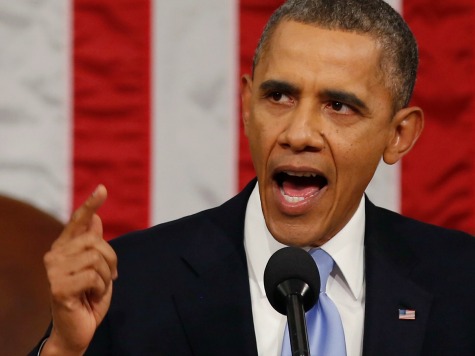Promising to address inequality and strengthen the middle class, President Obama’s State of the Union combined sound and foolish proposals, laced with good old fashioned demagoguery.
Despite nearly five years of economic recovery, the fortunes of working Americans have decidedly worsened. The president’s policies should carry considerable culpability and bear correction.
Instead, he pronounced upward mobility has stalled–when non-partisan economic studies show that’s not true–and insists the wealthy should pay to balance the accounts.
Thanks to the president’s free trade policies, multinational corporations and talented Americans have earned huge income gains selling knowhow and services around the globe. Meanwhile, the stuff ordinary Americans make is increasingly shut out of the fastest growing overseas markets.
GM boasts some of the best-selling cars in China, but high tariffs, regulations, and an artificially cheap currency keep out U.S.-made vehicles. The president refuses to effectively confront protectionism throughout Asia, denying Americans good paying jobs.
ObamaCare is driving up health insurance costs. Along with higher taxes, that curbs domestic purchases, slows economic recovery, and destroys jobs. Restrictions on offshore petroleum development, costly new banking and environmental regulations, and a shortage of lending by regional banks make it tougher for small businesses to expand and add employees.
No surprise, some 20 million Americans can’t find full-time work, and the inflation-adjusted wages ordinary workers earn are falling. Factoring in higher state and local taxes, most families are much worse off than five years ago, and record numbers of Americans depend on food stamps.
Now Obama wants to double down on failed initiatives. Instead of asking Congress to suspend the mandate that all Americans obtain excessive and expensive health insurance, he is launching an aggressive campaign to persuade young Americans to buy overpriced policies.
Presidential initiatives to build a national network of manufacturing innovation centers, strengthen infrastructure, federal job training and R&D, and rapidly expand industrial use of clean natural gas have great merit. Yet, no matter how strong the products and productive their workers, America’s factories need more customers at home and abroad to succeed, grow, and raise wages.
Unfortunately, the president proposes to push forward with new trade agreements in Asia that will further open U.S. markets to foreign competition without getting enforceable enough concessions on discriminatory regulations and currency manipulation that keep out American products and impoverish once-proud U.S. blue collar workers.
He wants Congress to approve a $10.10 an hour minimum wage. That’s a 39 percent jump, and hardly justified by the 9 percent inflation since the federal floor was set in July 2009. Such an increase would compel McDonalds to aggressively implement methods to cut employees. Smaller restaurants, whose customers simply cannot afford to pay another $2 for lunch, would close, and the same would repeat in other industries.
Comprehensive immigration reform would help. Bringing undocumented workers out of the shadows would raise the wages they command and those of citizens competing with them.
Republicans in Congress want a deal that really secures our borders from another surge of illegal immigrants. However, given the president’s poor record of sticking to his word in budget negotiations, critical members like Senator Marco Rubio are reluctant to trust him.
All this illustrates the central reason for Washington’s inaction on crucial issues.
The president dodges responsibility for the failures of his ideologically-motivated agenda by asking Congress to tax the “one percent” for simply exploiting conditions he created.
Americans judge the president by their own deteriorating conditions, and his credibility on economic issues is falling precipitously.
Members of Congress simply don’t trust him to address problems as the facts require and keep his word when it counts.
Peter Morici is an economist and professor at the Smith School of Business, University of Maryland and a widely published columnist. Follow him on Twitter.

COMMENTS
Please let us know if you're having issues with commenting.